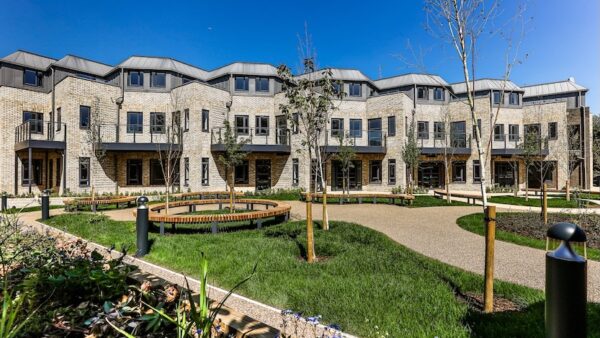
Building control surveyors must register with the Building Safety Regulator by 6 April – but progress has been slow to date. Will Mann speaks to LABC CEO Lorna Stimpson about her concerns over the registration process and the wider changes sweeping the profession.
These are busy times for Lorna Stimpson FCIOB, CEO of Local Authority Building Control (LABC). April is the deadline for building control surveyors to register with the Building Safety Regulator (BSR) and LABC’s Building Safety Competence Foundation (BSCF) is one of three assessment bodies that can provide the necessary certification of competence.
But the slow progress of certification and registration is ringing alarm bells. As CM revealed this week, just 1,547 – fewer than 40% – of building control surveyors have begun the registration process with the BSR.
Stimpson, who is an executive director for BSCF, is so worried she’s written to the government and regulator requesting a six-month postponement of the registration deadline.
“We’re working incredibly hard to get as many people through as we possibly can,” she says. “For those who haven’t begun the process of gaining their certification, they need to get on with it right away. Today. There is no time to waste.”
Sweeping changes
Registration with the BSR is one of many major changes sweeping a profession which Stimpson says has been “marginalised” in the past. That will change, she states confidently, helped by a suite of training and qualifications that LABC has been developing with CIOB over the past eight years (see box, p24) which is bringing a new generation of talent into the sector.

CV: Lorna Stimpson
2019-present – Chief executive, LABC
2019 – Deputy CEO, LABC
2015-19 – Deputy managing director, LABC
2011-15 – Managing director, LABC Consult
2008-11 – Business development director, LABC
2000-08 – Building control surveyor, Oldham Metropolitan Borough Council
1990-95 – Sheffield Hallam University, Building Surveying
FCIOB, FCMI, CBuildE, FCABE
But in the short term, “it’s a difficult time for building control”, Stimpson says. “The age demographic in the profession is very top heavy, and that’s because of austerity following the 2008 recession, a lack of investment and education not matching what we needed in building control.
Proving competency
“Now, because of the new competency certification requirement, if you’re a building control professional, public or private, you’ve got to prove that you’re competent to do the job you’ve been doing for 40 years. That’s a difficult pill to swallow. I wouldn’t blame people who decide to retire.
“But I appeal to them not to leave the profession. These very experienced surveyors are the people who we desperately need in building control over the next couple of years. Because the influx of new people can only learn if they’ve got experienced people around them. You don’t learn building control out of a book, you learn it on site, experientially, as I did.”
It was back in 2016 that LABC, which represents around 3,500 public sector building control surveyors, took the first steps towards reshaping the profession.
“We recognised there was a resourcing timebomb and approached CIOB about jointly developing building control training and qualifications,” explains Stimpson. “This work predates Grenfell, but that tragedy, plus Dame Judith Hackitt’s review and the Building Safety Act, has accelerated the process.”
Degree programme
In 2017, LABC started work with the University of Wolverhampton to create a degree programme. A year later, its Building Control Apprenticeship was approved, its Level 4 and Level 5 Building Control Diplomas started, and it was approved as a CIOB training provider. In 2019, the Building Control apprenticeship degree started with over 100 students in its first intake.
Meanwhile, addressing Hackitt’s challenge to construction to prove its competence, LABC began working with the Institution of Fire Engineers on a building control surveyors competency validation assessment for fire safety in higher-risk buildings (HRBs). This led to the creation of the BSCF in 2021 as a separate ‘community interest company’ to provide competence certification.
Stimpson says the competency assessments will be necessarily rigorous. “The interviews and the assessments are not a walk in the park: anyone in building control – experienced or trainee – will need to spend a lot of time and effort in preparing.”
Building control’s new era
- From April 2024 the profession will be regulated by the Building Safety Regulator (BSR). This will include a requirement for building control professionals to register with BSR.
- Before building inspectors apply to register with BSR they must have passed an independent competency assessment.
- This will evaluate their skills, knowledge, experience and behaviours against the building inspector competence framework.
- Competency assessments are provided by three approved schemes, run by: LABC’s Building Safety Competence Foundation (BSCF); the Chartered Association of Building Engineers (CABE); and Total Training Development.
- All registered building inspectors in England must comply with a code of conduct.
- A directory of approved building inspectors will be published by the BSR. It will also keep a separate register of private sector businesses that carry out building control work which replaces the approved inspector register run by CICAIR.
But that’s a good thing, she adds. “The new competency framework is defining what building control competence should look like. But it was never mapped in the way that it is now.
“And we know that our education programmes at LABC completely follow that competency framework – they are very much focused on the building regulations, the legislative structure.”
Following the Building Safety Act, the government has recognised the need for greater capacity in building control. Last year, LABC was awarded over £20m by the Department for Levelling Up, Housing and Communities (DLUHC) to recruit 110 trainee building control surveyors. LABC received over 1,000 applications for the roles. These trainees – and many others – will have their competence validated by the BSCF.
Attitudes will change
With certification and registration, attitudes towards building control will change, Stimpson believes.
“Registration elevates building control, and makes people think ‘oh, right, actually, that’s a registered profession’. It now has a status and kudos that it didn’t in the past.
“Building control used to have its own degree, then it got subsumed into building surveying; now that degree qualification is back – it gives more self-respect for the profession.
“We’re also seeing different people come into the role and I think it will be a much more diverse profession going forward. Of the recent 110 trainees recruited, 29% were female – far higher than the overall construction industry average – and 66% are embarking on their second careers.”
Stimpson also thinks the culture around building control will change. “Building control used to be seen as a commodity. ‘The least intervention at the least price’ was the way that it was treated.
“But now, driven by the registration of the profession, building control surveyors will be regarded as a vital part of ensuring compliance. They will be able to visit sites and say, ‘we need you to prove that this building complies with the building regulations’.
“They will have more time to do the job that they’re experts in, which is helping organisations comply with the legislation and the regulations.
“That’s an important culture change and it’s what Dame Judith Hackitt has called for.”
Private sector control?
Post Grenfell, the debate over building safety regulation has questioned whether there should be private sector building control.
Stimpson says she’s “split” on the issue. “There are excellent building control surveyors in both public and private sector. But there has been criticism about building control not having direct stewardship for a long time, and some will say that these changes are not a moment too soon.
“If everybody is working to a level playing field, if they are all registered and equally scrutinised, the debate about the public and private sector building control divide should go away.”
As 6 April approaches, things will only get busier for Stimpson and BSCF. “We’ve got 2,500 somewhere in our system, and we expect about 900 will be certified by April, although obviously I am not able to comment on those going through the other
two assessment bodies,” she says.
Looking past April, LABC’s education work will continue. “Construction is constantly evolving, so we’ve got to evolve with it,” Stimpson says. “Our content can never stand still. We’re already running bespoke level six learning courses that are accredited by CIOB, such as fire safety. We’ve also got an idea for a master’s degree in building control surveying.
“And we’ll continue working with CIOB on this. They’ve held our hands all the way through development of our education programme and been absolutely vital in helping LABC do what we can do now.”
Building Inspector Competence Framework
The Building Safety Regulator has created four registration classes for building inspectors:
Trainee building inspector. Works in a trainee capacity, must work supervised until they register in one of the other three classes.
Building inspector. Can work on all building types other than those dealt with by class 3 specialist inspectors.
Specialist building inspector. Has additional knowledge and experience required to work on all building types including non-standard and higher-risk buildings.
Building inspector (technical manager). Has the competence of a class 2 or 3 building inspector and is responsible for management of the building control function.
Building inspectors must demonstrate competence across nine subject areas: law; technology; building services; functions and activities; plans assessment and enforcement; inspection and enforcement; management and core skills; safety management; and ethics.
The required level of competence for each subject area varies according to registration class, with four competency levels defined: A Awareness; B Appreciation; C Understanding; D Comprehensive.
CIOB and LABC building control training and qualifications
CIOB and LABC have developed a suite of vocational building control qualifications, to demonstrate competence and raise standards.
- CIOB Level 3 Certificate in Technical Support for Public Service Building Standards
- CIOB Level 4 Diploma in Public Service Building Control Surveying
- CIOB Level 5 Diploma in Public Service Building Control Surveying
- CIOB Level 6 Certificate in Fire Safety for Building Control – Complex Buildings
- CIOB Level 6 Certificate in Managing Legislative Compliance in Building Control
- CIOB Level 6 Certificate in Managing Public Service Building Control
- CIOB Level 6 Certificate in Building Control for Safety at Sports Grounds and other Public Events
Graduates at Levels 4 and 5 have direct routes to join the University of Wolverhampton’s levy funded apprenticeship degree or the non-levy funded top-up degree. Graduates from both gain a BSc (Hons) Degree in Building Control Surveying.
Further information on building control courses











